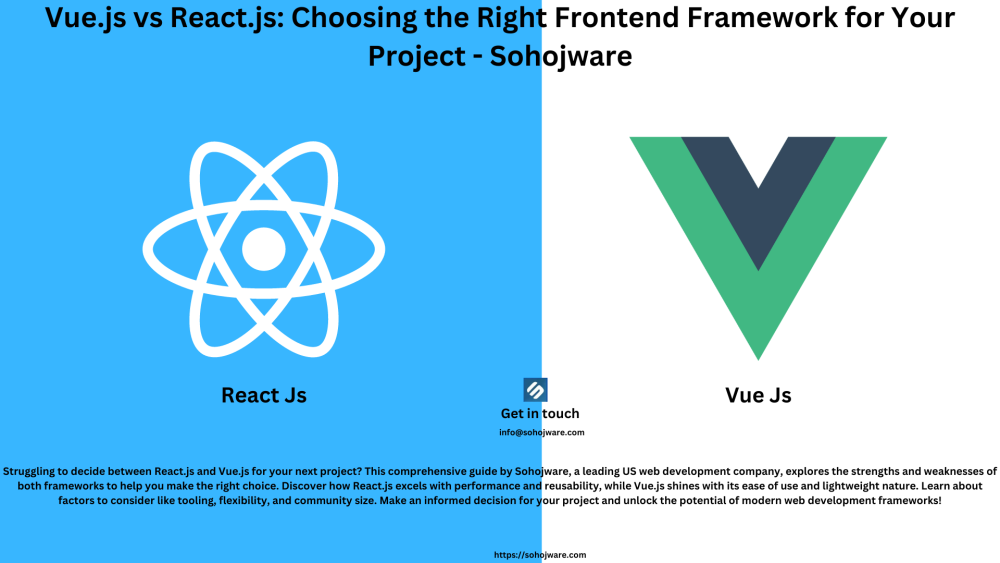Choosing the right front-end framework for your project is a critical decision that can significantly impact development efficiency and the overall performance of your application. Both Vue.js and React.js are popular options that offer distinct advantages and cater to different project needs. This comprehensive comparison, brought to you by Sohojware, a leading web development company, will help you navigate the key features of both frameworks and guide you toward selecting the ideal one for your project.
React: A powerful and versatile framework
Developed by Facebook in 2013, React is an open-source JavaScript library that empowers developers to create reusable UI components. This reusability fosters faster development cycles and promotes code maintainability. React's ecosystem, with a vast collection of users, tools, and resources, makes it a compelling choice for enterprise-grade applications. With its tenth birthday approaching, React is considered a mature technology, having undergone extensive refinement and testing within the industry.
Advantages of Using React
-
Superior Performance: A core strength of React is its emphasis on performance. React applications leverage a virtual DOM, a lightweight representation of the actual DOM, which enables efficient updates. Whenever component changes occur, React selectively updates only the affected parts of the real DOM, resulting in faster rendering and a more responsive user experience.
-
Reusable Components: React's component-based architecture promotes code reusability. Developers can construct reusable UI components, accelerating development and ensuring consistency across the application. This modular approach also simplifies code maintenance and debugging.
-
Clean and Maintainable Code: The component-based structure of React naturally leads to well-organized and clean code. This improves code readability and maintainability and facilitates collaboration within development teams.
Potential Drawbacks of React
-
Frequent Updates: React undergoes frequent updates to introduce new features and enhance performance. While these updates benefit developers by incorporating the latest web standards, they can also necessitate adjustments to existing codebases to stay compatible. This can require developers to invest time in keeping their skill sets current.
-
Additional Tools Required: As React primarily focuses on the front end, you might need to integrate additional tools and libraries to create a complete development environment. While this can be viewed as an advantage in terms of flexibility, it can also add complexity to the project setup.
Vue.js: A Versatile and Lightweight Framework
Introduced in 2014 by Evan You, a former Google engineer, Vue.js is a progressive JavaScript framework designed for building user interfaces and single-page applications (SPAs). Vue.js is known for its versatility and focus on progressive adoption. Developers can seamlessly integrate Vue.js into existing projects without disrupting core functionalities. Due to its lightweight nature and exceptional performance, Vue.js is an excellent choice for developing minimum viable products (MVPs). Here are some of the leading companies that have successfully leveraged Vue.js: Alibaba, Grammarly, GitLab, Behance, and Adobe Portfolio.
Strengths of Vue.js
-
Readability and Single-File Components: Vue.js employs a component-based architecture, similar to React, that promotes code readability and maintainability. Vue.js components can be reused to construct custom UIs, accelerating development and fostering consistency. This modular approach also facilitates unit testing, allowing developers to test individual components in isolation.
-
Comprehensive Tooling Ecosystem: Since its inception, Vue.js has cultivated a powerful ecosystem of complementary tools. The Vue CLI (Command Line Interface) serves as a valuable asset, offering a rich set of frontend plugins and streamlining project creation and management through a graphical user interface. Vue.js also integrates seamlessly with popular tools like TypeScript, Babel, unit testing frameworks, server-side rendering solutions, and browser debugging tools.
-
Exceptional Performance: Vue.js is a lightweight framework, and combined with its utilization of a virtual DOM for rendering, it empowers developers to construct high-performance SPAs with responsive interfaces. Vue.js applications often boast faster initial load times compared to React and Angular applications.
-
Compact Size: Vue.js is a remarkably lightweight framework, weighing approximately 18kb in zipped format. This translates to effortless download and installation processes, while also contributing to the overall performance of applications built with Vue.js.
Considerations When Using Vue.js
-
Flexibility Can Lead to Complexity: Vue.js is renowned for its flexibility, offering developers a high degree of creative freedom when constructing user interfaces. While this empowers developers to craft unique UIs and implement innovative features, it can introduce complexity, particularly in large-scale projects.
Conclusion
The article currently ends abruptly after discussing the considerations of Vue.js. A strong conclusion would summarize the key takeaways, reiterate the factors to consider when choosing a framework and provide a call to action (CTA). The CTA could encourage readers to contact Sohojware for a free consultation to discuss their project needs and determine the most suitable framework.
In conclusion, both React.js and Vue.js are powerful JavaScript frameworks that can empower you to build high-performing web applications. The ideal choice for your project hinges on your specific requirements and priorities. React.js excels in large-scale enterprise applications with its vast ecosystem and powerful tooling. Vue.js shines with its exceptional performance, ease of use, and focus on progressive adoption.
Sohojware, a leading web development company in the United States, boasts a team of experienced developers well-versed in both React.js and Vue.js. We offer free consultations to help you assess your project needs and identify the most suitable framework to achieve your goals. Contact us today to discuss your project and unlock the potential of cutting-edge web development!
FAQs
-
React vs. Vue.js: Which framework is faster?
Both React and Vue.js are known for their performance optimizations. React utilizes a virtual DOM for efficient updates, while Vue.js is a lightweight framework with a fast initial load time. In general, Vue.js applications might have a slight edge in initial load speed, while React can excel in optimizing updates for complex UIs.
- I'm new to JavaScript. Should I learn React or Vue.js?
Vue.js is often praised for its gentle learning curve due to its clear syntax and well-structured documentation. This makes it a great starting point for beginners in JavaScript and web development. React, while powerful, might require a steeper learning curve due to its JSX syntax and concepts like state management.
-
Does Sohojware specialize in React or Vue.js development?
Sohojware, a leading web development company in the US, boasts a team of experienced developers well-versed in both React.js and Vue.js. We understand the strengths and weaknesses of each framework and can help you choose the most suitable option for your project needs.
-
My project requires a large ecosystem of tools and libraries. Is React or Vue.js a better fit?
React enjoys a vast ecosystem of third-party libraries and tools due to its wider adoption. This offers developers a broader range of options for various functionalities. However, Vue.js is catching up quickly, and its core framework provides a solid foundation for building complex applications.
-
I need to build a minimum viable product (MVP) quickly. Which framework should I use?
Due to its lightweight nature and ease of use, Vue.js is an excellent choice for developing MVPs. It allows for rapid prototyping and iteration cycles, enabling you to get your core functionalities up and running swiftly.




